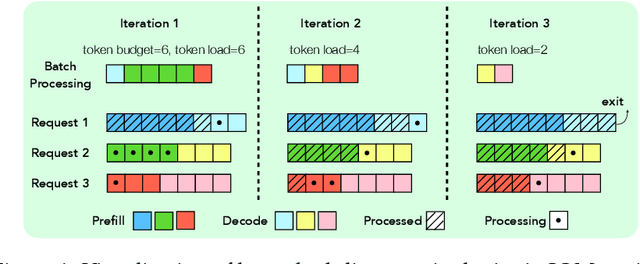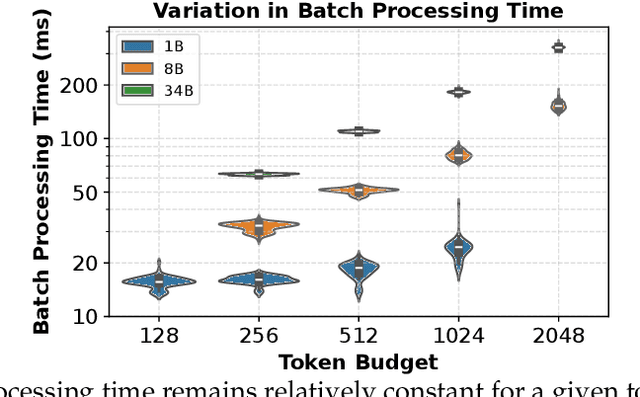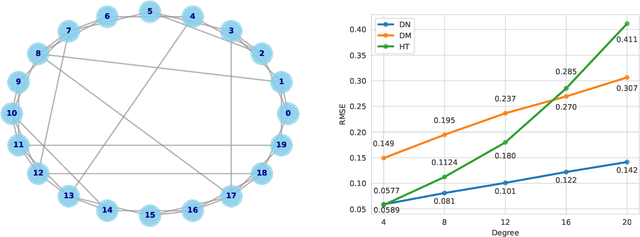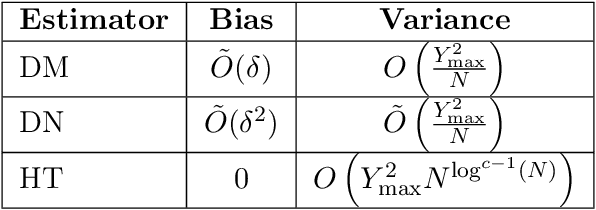Tianyi Peng
Speculative Actions: A Lossless Framework for Faster Agentic Systems
Oct 05, 2025Abstract:Despite growing interest in AI agents across industry and academia, their execution in an environment is often slow, hampering training, evaluation, and deployment. For example, a game of chess between two state-of-the-art agents may take hours. A critical bottleneck is that agent behavior unfolds sequentially: each action requires an API call, and these calls can be time-consuming. Inspired by speculative execution in microprocessors and speculative decoding in LLM inference, we propose speculative actions, a lossless framework for general agentic systems that predicts likely actions using faster models, enabling multiple steps to be executed in parallel. We evaluate this framework across three agentic environments: gaming, e-commerce, web search, and a "lossy" extension for an operating systems environment. In all cases, speculative actions achieve substantial accuracy in next-action prediction (up to 55%), translating into significant reductions in end-to-end latency. Moreover, performance can be further improved through stronger guessing models, top-K action prediction, multi-step speculation, and uncertainty-aware optimization, opening a promising path toward deploying low-latency agentic systems in the real world.
AI Agents for Web Testing: A Case Study in the Wild
Sep 05, 2025Abstract:Automated web testing plays a critical role in ensuring high-quality user experiences and delivering business value. Traditional approaches primarily focus on code coverage and load testing, but often fall short of capturing complex user behaviors, leaving many usability issues undetected. The emergence of large language models (LLM) and AI agents opens new possibilities for web testing by enabling human-like interaction with websites and a general awareness of common usability problems. In this work, we present WebProber, a prototype AI agent-based web testing framework. Given a URL, WebProber autonomously explores the website, simulating real user interactions, identifying bugs and usability issues, and producing a human-readable report. We evaluate WebProber through a case study of 120 academic personal websites, where it uncovered 29 usability issues--many of which were missed by traditional tools. Our findings highlight agent-based testing as a promising direction while outlining directions for developing next-generation, user-centered testing frameworks.
Twin-2K-500: A dataset for building digital twins of over 2,000 people based on their answers to over 500 questions
May 23, 2025Abstract:LLM-based digital twin simulation, where large language models are used to emulate individual human behavior, holds great promise for research in AI, social science, and digital experimentation. However, progress in this area has been hindered by the scarcity of real, individual-level datasets that are both large and publicly available. This lack of high-quality ground truth limits both the development and validation of digital twin methodologies. To address this gap, we introduce a large-scale, public dataset designed to capture a rich and holistic view of individual human behavior. We survey a representative sample of $N = 2,058$ participants (average 2.42 hours per person) in the US across four waves with 500 questions in total, covering a comprehensive battery of demographic, psychological, economic, personality, and cognitive measures, as well as replications of behavioral economics experiments and a pricing survey. The final wave repeats tasks from earlier waves to establish a test-retest accuracy baseline. Initial analyses suggest the data are of high quality and show promise for constructing digital twins that predict human behavior well at the individual and aggregate levels. By making the full dataset publicly available, we aim to establish a valuable testbed for the development and benchmarking of LLM-based persona simulations. Beyond LLM applications, due to its unique breadth and scale the dataset also enables broad social science research, including studies of cross-construct correlations and heterogeneous treatment effects.
AdaKWS: Towards Robust Keyword Spotting with Test-Time Adaptation
May 20, 2025Abstract:Spoken keyword spotting (KWS) aims to identify keywords in audio for wide applications, especially on edge devices. Current small-footprint KWS systems focus on efficient model designs. However, their inference performance can decline in unseen environments or noisy backgrounds. Test-time adaptation (TTA) helps models adapt to test samples without needing the original training data. In this study, we present AdaKWS, the first TTA method for robust KWS to the best of our knowledge. Specifically, 1) We initially optimize the model's confidence by selecting reliable samples based on prediction entropy minimization and adjusting the normalization statistics in each batch. 2) We introduce pseudo-keyword consistency (PKC) to identify critical, reliable features without overfitting to noise. Our experiments show that AdaKWS outperforms other methods across various conditions, including Gaussian noise and real-scenario noises. The code will be released in due course.
AnalyticKWS: Towards Exemplar-Free Analytic Class Incremental Learning for Small-footprint Keyword Spotting
May 17, 2025Abstract:Keyword spotting (KWS) offers a vital mechanism to identify spoken commands in voice-enabled systems, where user demands often shift, requiring models to learn new keywords continually over time. However, a major problem is catastrophic forgetting, where models lose their ability to recognize earlier keywords. Although several continual learning methods have proven their usefulness for reducing forgetting, most existing approaches depend on storing and revisiting old data to combat catastrophic forgetting. Though effective, these methods face two practical challenges: 1) privacy risks from keeping user data and 2) large memory and time consumption that limit deployment on small devices. To address these issues, we propose an exemplar-free Analytic Continual Learning (AnalyticKWS) method that updates model parameters without revisiting earlier data. Inspired by efficient learning principles, AnalyticKWS computes a closed-form analytical solution for model updates and requires only a single epoch of adaptation for incoming keywords. AnalyticKWS demands fewer computational resources by avoiding gradient-based updates and does not store old data. By eliminating the need for back-propagation during incremental learning, the model remains lightweight and efficient. As a result, AnalyticKWS meets the challenges mentioned earlier and suits resource-limited settings well. Extensive experiments on various datasets and settings show that AnalyticKWS consistently outperforms existing continual learning methods.
Throughput-Optimal Scheduling Algorithms for LLM Inference and AI Agents
Apr 10, 2025



Abstract:As demand for Large Language Models (LLMs) and AI agents rapidly grows, optimizing systems for efficient LLM inference becomes critical. While significant efforts have targeted system-level engineering, little is explored through a mathematical modeling and queuing perspective. In this paper, we aim to develop the queuing fundamentals for LLM inference, bridging the gap between queuing and LLM system communities. In particular, we study the throughput aspect in LLM inference systems. We prove that a large class of 'work-conserving' scheduling algorithms can achieve maximum throughput for both individual requests and AI agent workloads, highlighting 'work-conserving' as a key design principle in practice. Evaluations of real-world systems show that Orca and Sarathi-serve are throughput-optimal, reassuring practitioners, while FastTransformer and vanilla vLLM are not maximally stable and should be used with caution. Our results highlight the substantial benefits queuing community can offer in improving LLM inference systems and call for more interdisciplinary developments.
Data Mixture Optimization: A Multi-fidelity Multi-scale Bayesian Framework
Mar 26, 2025Abstract:Careful curation of data sources can significantly improve the performance of LLM pre-training, but predominant approaches rely heavily on intuition or costly trial-and-error, making them difficult to generalize across different data domains and downstream tasks. Although scaling laws can provide a principled and general approach for data curation, standard deterministic extrapolation from small-scale experiments to larger scales requires strong assumptions on the reliability of such extrapolation, whose brittleness has been highlighted in prior works. In this paper, we introduce a $\textit{probabilistic extrapolation framework}$ for data mixture optimization that avoids rigid assumptions and explicitly models the uncertainty in performance across decision variables. We formulate data curation as a sequential decision-making problem$\unicode{x2013}$multi-fidelity, multi-scale Bayesian optimization$\unicode{x2013}$where $\{$data mixtures, model scale, training steps$\}$ are adaptively selected to balance training cost and potential information gain. Our framework naturally gives rise to algorithm prototypes that leverage noisy information from inexpensive experiments to systematically inform costly training decisions. To accelerate methodological progress, we build a simulator based on 472 language model pre-training runs with varying data compositions from the SlimPajama dataset. We observe that even simple kernels and acquisition functions can enable principled decisions across training models from 20M to 1B parameters and achieve $\textbf{2.6x}$ and $\textbf{3.3x}$ speedups compared to multi-fidelity BO and random search baselines. Taken together, our framework underscores potential efficiency gains achievable by developing principled and transferable data mixture optimization methods.
LLM Generated Persona is a Promise with a Catch
Mar 18, 2025Abstract:The use of large language models (LLMs) to simulate human behavior has gained significant attention, particularly through personas that approximate individual characteristics. Persona-based simulations hold promise for transforming disciplines that rely on population-level feedback, including social science, economic analysis, marketing research, and business operations. Traditional methods to collect realistic persona data face significant challenges. They are prohibitively expensive and logistically challenging due to privacy constraints, and often fail to capture multi-dimensional attributes, particularly subjective qualities. Consequently, synthetic persona generation with LLMs offers a scalable, cost-effective alternative. However, current approaches rely on ad hoc and heuristic generation techniques that do not guarantee methodological rigor or simulation precision, resulting in systematic biases in downstream tasks. Through extensive large-scale experiments including presidential election forecasts and general opinion surveys of the U.S. population, we reveal that these biases can lead to significant deviations from real-world outcomes. Our findings underscore the need to develop a rigorous science of persona generation and outline the methodological innovations, organizational and institutional support, and empirical foundations required to enhance the reliability and scalability of LLM-driven persona simulations. To support further research and development in this area, we have open-sourced approximately one million generated personas, available for public access and analysis at https://huggingface.co/datasets/Tianyi-Lab/Personas.
Differences-in-Neighbors for Network Interference in Experiments
Mar 04, 2025



Abstract:Experiments in online platforms frequently suffer from network interference, in which a treatment applied to a given unit affects outcomes for other units connected via the platform. This SUTVA violation biases naive approaches to experiment design and estimation. A common solution is to reduce interference by clustering connected units, and randomizing treatments at the cluster level, typically followed by estimation using one of two extremes: either a simple difference-in-means (DM) estimator, which ignores remaining interference; or an unbiased Horvitz-Thompson (HT) estimator, which eliminates interference at great cost in variance. Even combined with clustered designs, this presents a limited set of achievable bias variance tradeoffs. We propose a new estimator, dubbed Differences-in-Neighbors (DN), designed explicitly to mitigate network interference. Compared to DM estimators, DN achieves bias second order in the magnitude of the interference effect, while its variance is exponentially smaller than that of HT estimators. When combined with clustered designs, DN offers improved bias-variance tradeoffs not achievable by existing approaches. Empirical evaluations on a large-scale social network and a city-level ride-sharing simulator demonstrate the superior performance of DN in experiments at practical scale.
How Well do LLMs Compress Their Own Chain-of-Thought? A Token Complexity Approach
Mar 03, 2025Abstract:Chain-of-thought prompting has emerged as a powerful technique for enabling large language models (LLMs) to solve complex reasoning tasks. However, these reasoning chains can be verbose, raising concerns about efficiency. In response, recent works have sought to decrease response lengths through simple prompting strategies (e.g. 'be concise'). In this work, we conduct the first systematic study of the relationship between reasoning length and model performance across a diverse range of compression instructions (e.g. 'use 10 words or less' or 'remove all punctuation'). In doing so, we discover a universal tradeoff between reasoning length and accuracy that persists across even very distinct reasoning chains. We demonstrate that this tradeoff emerges from a sharp threshold behavior at the question level: each task has an intrinsic 'token complexity' - a minimal number of tokens required for successful problem-solving. We show how token complexity enables us to compute information-theoretic limits on the accuracy-compression tradeoff, and find that prompt-based compression strategies operate far from these theoretical limits. This suggests there may be significant room for improvement and our framework provides a benchmark to help researchers evaluate progress in reasoning efficiency. Our work also highlights the importance of adaptive compression -- giving shorter responses for easier questions -- and we show that token complexity is a useful tool for measuring this capability.
 Add to Chrome
Add to Chrome Add to Firefox
Add to Firefox Add to Edge
Add to Edge